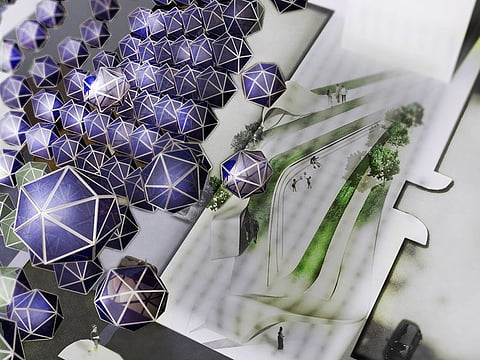UAE architect wins "Cool Abu Dhabi" award for designing The Circadian Clouds
Emkaan founder Muhammad Obaid has used technology to design engaging outdoor public spaces

Muhammad Obaid, architect and founder of UAE’s homegrown architecture and engineering consultancy Emkaan has won the “Cool Abu Dhabi” award for The Circadian Clouds design that offers thermal comfort in outdoor public spaces, thereby increasing our engagement levels. Obaid’s “nature inspired” design was chosen by the Department of Municipalities and Transport in Abu Dhabi, out of 1570 entries that were received from more than 76 participating countries around the world. In an interview to Property Weekly, Muhammad Obaid talks about how architecture and technology can offer efficient solutions for controlling the microclimate.
How does it feel winning the “Cool Abu Dhabi” award?
I feel happy that I could give my team a live example of how to break the boundaries of “the impossible.” This award makes me confident that my firm and I are on the right path. We have allocated significant time and resources to trying new things. Yes, it takes time, money and a lot of patience, but creating architectural and urban spaces that brings joy and happiness to people is worth it!
You are an architect and an engineer. How do you weave science and art together?
When I start a new project I try to find a link between people, the unique qualities of the site and the universe. In nature, science and art are already weaved, it’s just like two faces of a coin. A flower has beautiful fragrance, touch and color (art) and it has functional small shafts, moving liquids from the soil to its petals with leaves (engineering). All of that still can be represented by a beautiful mathematical equation in phyllotaxy (science). I think the answer in brief should be patience and to let myself go with that beautiful flow.
What does the “The Circadian Clouds” actually mean?
The common traditional way of using canopies, pergolas or any other shading structure to provide outdoor thermal comfort always blocks the sky and turns the outdoor into a semi-indoor space. Alternatively, the only other way to enjoy the outdoors in this region is to turn it into “indoor” unless the sky is cloudy - this is where the real joy happens where you find people enjoying the outdoor area. The idea was to provide an artificial cloud, which is very high and have minimum sky blockage, so that people will feel its presence, but they will not see it unless they look towards the sun. Since the sun is moving, we needed this cloud to move with the sun to keep the targeted area in the shade at all times, and here we found the answer again in nature with the Circadian rhythm.
The Circadian rhythm is a biological process that, in a simplified way, responses to the earth rotation around its axis causing the day and night. A very good example of the Circadian rhythm is the sunflower, it uses the Circadian clock to have its face always towards the sun. So, we wanted a cloud that follows the Circadian rhythm; that’s why it’s called the Circadian Clouds.
Is it sustainable to provide continuous shade?
The Circadian Clouds is composed of small floating cells that uses sun energy to generate electricity and store daylight to reuse it during night time; it’s not only a self-sustained system, but also reduces the energy consumption for the shaded building around it.
Covid-19 has changed the way people occupy public spaces. Is that the “new normal”?
Covid-19 has opened our eyes to the potential of spaces. For example, I know people who, in no time, changed their unused storage room into an office. This potential was always there in public spaces, but perhaps we didn’t have the courage to do it. Another example is that of the sikka, a three-metre alley between plots and it is always abandoned. When you walk in such a public space, you hear it telling you “develop me”. I see such spaces, under the shade of The Circadian Clouds, being developed into beautiful outdoor art galleries, interactive walls or even outdoor libraries.
How can designs like this improve the climate resilience in the UAE?
By having The Circadian Clouds and it’s applications we’ve managed, through computer modeling, not only to reduce the direct and indirect sun, but also to control the natural breeze. Essentially you could be speaking about ‘importing’ a cooler climate to the UAE, which I think with time could make the UAE a year-round touristic attraction.
What is the technology used?
The Circadian Clouds is composed of multi floating cells that work together to take the shape of the space we want to shade, and keeps moving with the sun to maintain the shadow position and shape. Each cell is a structure that carries solar panels on top and photo chromatic panels to store sunlight on the sides and bottom. The cell is self-lifted using helium gas, making it easier for the attached fans to control the position and altitude.
Sign up for the Daily Briefing
Get the latest news and updates straight to your inbox


